Detailed Analysis of UK Law: Classification, Sources, and Impact
VerifiedAdded on 2023/06/09
|10
|2218
|273
Report
AI Summary
This report provides a comprehensive overview of the UK legal system. It begins by defining UK law and classifying it into private and public law, discussing the roles of common law and civil law. The report then identifies the three main jurisdictions within the UK: England, Scotland, and Northern Ireland, detailing the court systems in each. The core of the report explores the sources of UK law, including common law, case law (judicial precedent), legislation, and European Union law. It defines each principle and examines how the law impacts multilingual organizations, particularly through translation, interpretation, and multilingual legislative acts. Finally, the report explains how UK law processes affect commercial organizations, focusing on contract law and its essential elements, such as offer, acceptance, consideration, and intention. References to relevant books and journals are provided.

Sample
Paraphrase This Document
Need a fresh take? Get an instant paraphrase of this document with our AI Paraphraser
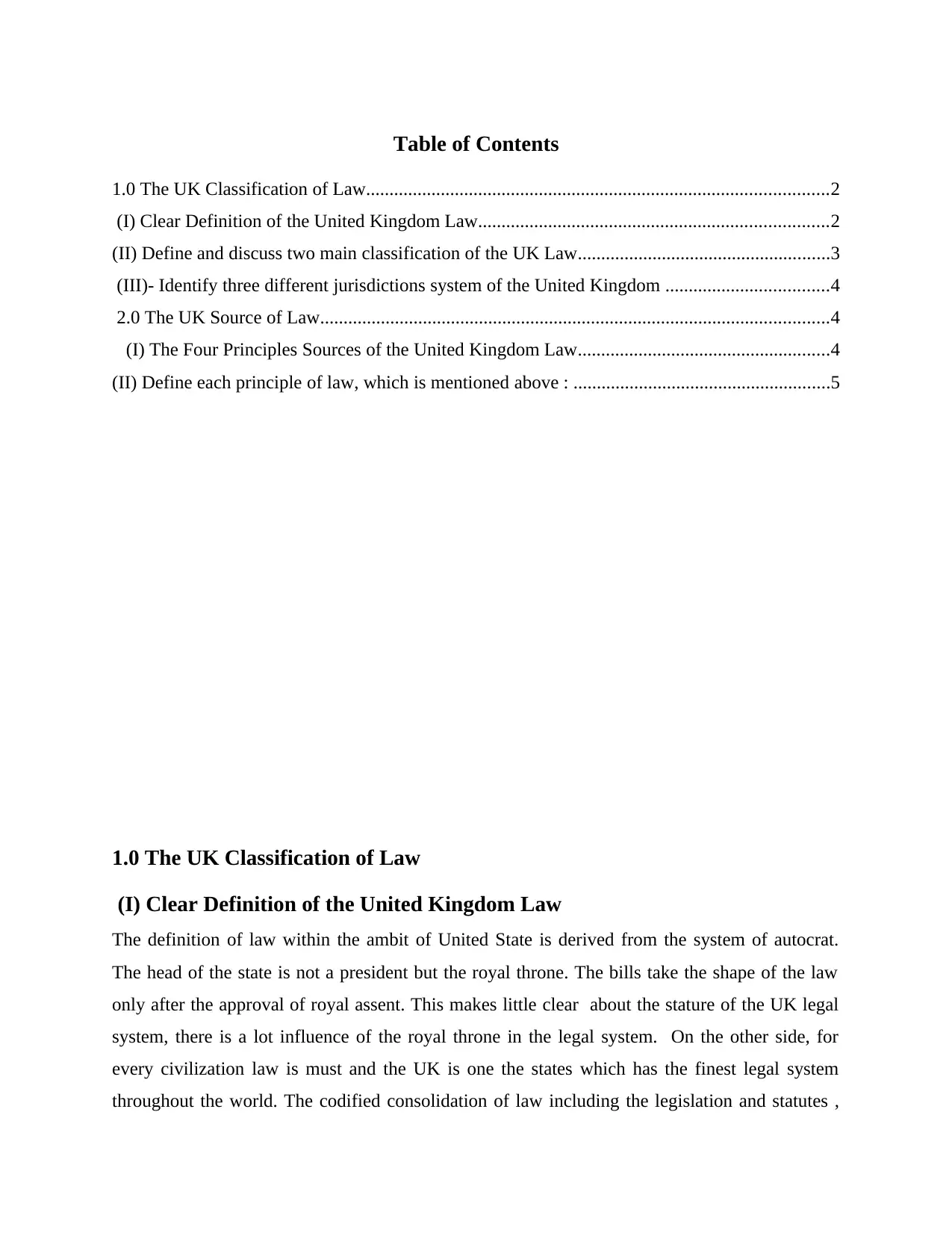
Table of Contents
1.0 The UK Classification of Law...................................................................................................2
(I) Clear Definition of the United Kingdom Law...........................................................................2
(II) Define and discuss two main classification of the UK Law......................................................3
(III)- Identify three different jurisdictions system of the United Kingdom ...................................4
2.0 The UK Source of Law.............................................................................................................4
(I) The Four Principles Sources of the United Kingdom Law......................................................4
(II) Define each principle of law, which is mentioned above : .......................................................5
1.0 The UK Classification of Law
(I) Clear Definition of the United Kingdom Law
The definition of law within the ambit of United State is derived from the system of autocrat.
The head of the state is not a president but the royal throne. The bills take the shape of the law
only after the approval of royal assent. This makes little clear about the stature of the UK legal
system, there is a lot influence of the royal throne in the legal system. On the other side, for
every civilization law is must and the UK is one the states which has the finest legal system
throughout the world. The codified consolidation of law including the legislation and statutes ,
1.0 The UK Classification of Law...................................................................................................2
(I) Clear Definition of the United Kingdom Law...........................................................................2
(II) Define and discuss two main classification of the UK Law......................................................3
(III)- Identify three different jurisdictions system of the United Kingdom ...................................4
2.0 The UK Source of Law.............................................................................................................4
(I) The Four Principles Sources of the United Kingdom Law......................................................4
(II) Define each principle of law, which is mentioned above : .......................................................5
1.0 The UK Classification of Law
(I) Clear Definition of the United Kingdom Law
The definition of law within the ambit of United State is derived from the system of autocrat.
The head of the state is not a president but the royal throne. The bills take the shape of the law
only after the approval of royal assent. This makes little clear about the stature of the UK legal
system, there is a lot influence of the royal throne in the legal system. On the other side, for
every civilization law is must and the UK is one the states which has the finest legal system
throughout the world. The codified consolidation of law including the legislation and statutes ,
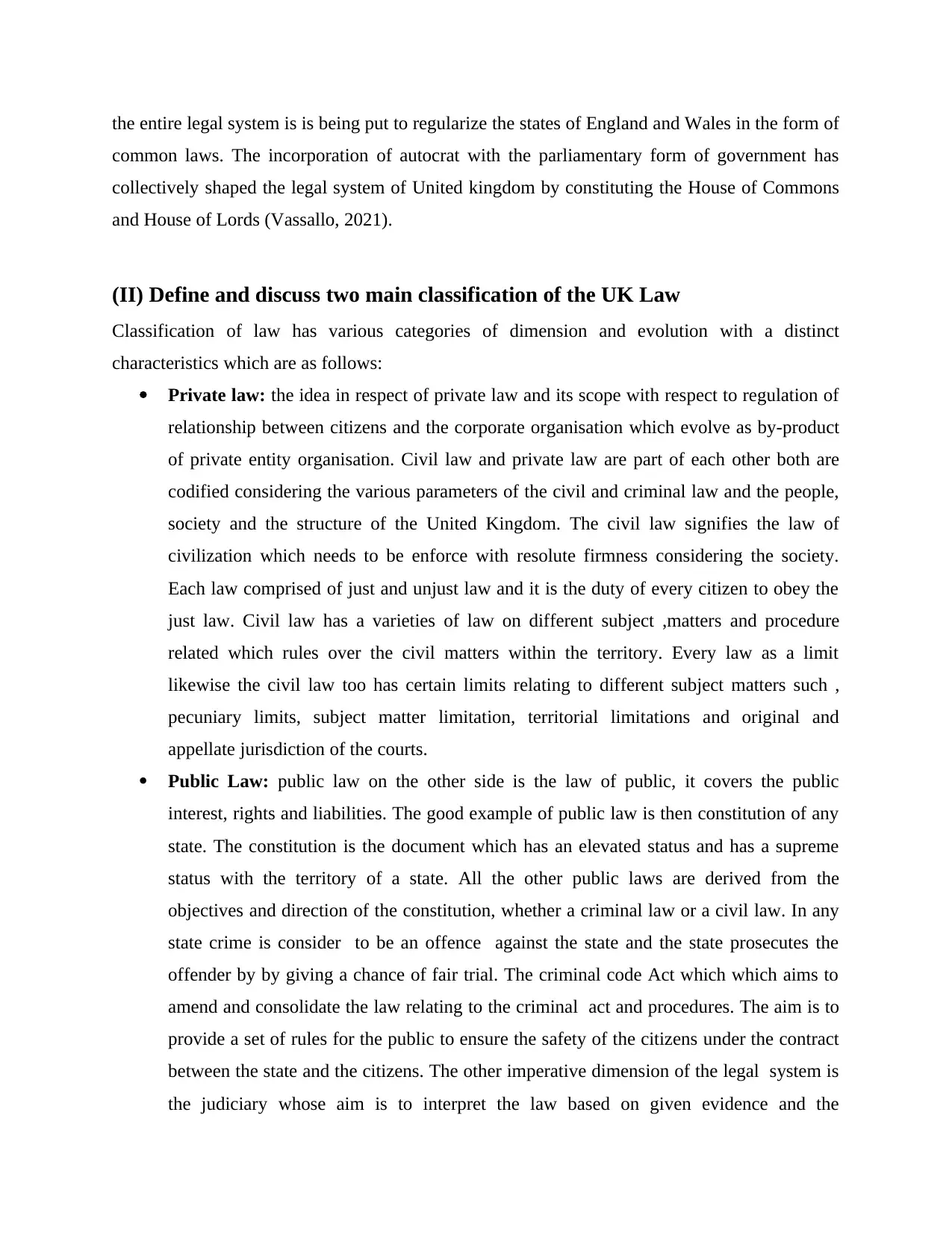
the entire legal system is is being put to regularize the states of England and Wales in the form of
common laws. The incorporation of autocrat with the parliamentary form of government has
collectively shaped the legal system of United kingdom by constituting the House of Commons
and House of Lords (Vassallo, 2021).
(II) Define and discuss two main classification of the UK Law
Classification of law has various categories of dimension and evolution with a distinct
characteristics which are as follows:
Private law: the idea in respect of private law and its scope with respect to regulation of
relationship between citizens and the corporate organisation which evolve as by-product
of private entity organisation. Civil law and private law are part of each other both are
codified considering the various parameters of the civil and criminal law and the people,
society and the structure of the United Kingdom. The civil law signifies the law of
civilization which needs to be enforce with resolute firmness considering the society.
Each law comprised of just and unjust law and it is the duty of every citizen to obey the
just law. Civil law has a varieties of law on different subject ,matters and procedure
related which rules over the civil matters within the territory. Every law as a limit
likewise the civil law too has certain limits relating to different subject matters such ,
pecuniary limits, subject matter limitation, territorial limitations and original and
appellate jurisdiction of the courts.
Public Law: public law on the other side is the law of public, it covers the public
interest, rights and liabilities. The good example of public law is then constitution of any
state. The constitution is the document which has an elevated status and has a supreme
status with the territory of a state. All the other public laws are derived from the
objectives and direction of the constitution, whether a criminal law or a civil law. In any
state crime is consider to be an offence against the state and the state prosecutes the
offender by by giving a chance of fair trial. The criminal code Act which which aims to
amend and consolidate the law relating to the criminal act and procedures. The aim is to
provide a set of rules for the public to ensure the safety of the citizens under the contract
between the state and the citizens. The other imperative dimension of the legal system is
the judiciary whose aim is to interpret the law based on given evidence and the
common laws. The incorporation of autocrat with the parliamentary form of government has
collectively shaped the legal system of United kingdom by constituting the House of Commons
and House of Lords (Vassallo, 2021).
(II) Define and discuss two main classification of the UK Law
Classification of law has various categories of dimension and evolution with a distinct
characteristics which are as follows:
Private law: the idea in respect of private law and its scope with respect to regulation of
relationship between citizens and the corporate organisation which evolve as by-product
of private entity organisation. Civil law and private law are part of each other both are
codified considering the various parameters of the civil and criminal law and the people,
society and the structure of the United Kingdom. The civil law signifies the law of
civilization which needs to be enforce with resolute firmness considering the society.
Each law comprised of just and unjust law and it is the duty of every citizen to obey the
just law. Civil law has a varieties of law on different subject ,matters and procedure
related which rules over the civil matters within the territory. Every law as a limit
likewise the civil law too has certain limits relating to different subject matters such ,
pecuniary limits, subject matter limitation, territorial limitations and original and
appellate jurisdiction of the courts.
Public Law: public law on the other side is the law of public, it covers the public
interest, rights and liabilities. The good example of public law is then constitution of any
state. The constitution is the document which has an elevated status and has a supreme
status with the territory of a state. All the other public laws are derived from the
objectives and direction of the constitution, whether a criminal law or a civil law. In any
state crime is consider to be an offence against the state and the state prosecutes the
offender by by giving a chance of fair trial. The criminal code Act which which aims to
amend and consolidate the law relating to the criminal act and procedures. The aim is to
provide a set of rules for the public to ensure the safety of the citizens under the contract
between the state and the citizens. The other imperative dimension of the legal system is
the judiciary whose aim is to interpret the law based on given evidence and the
⊘ This is a preview!⊘
Do you want full access?
Subscribe today to unlock all pages.

Trusted by 1+ million students worldwide
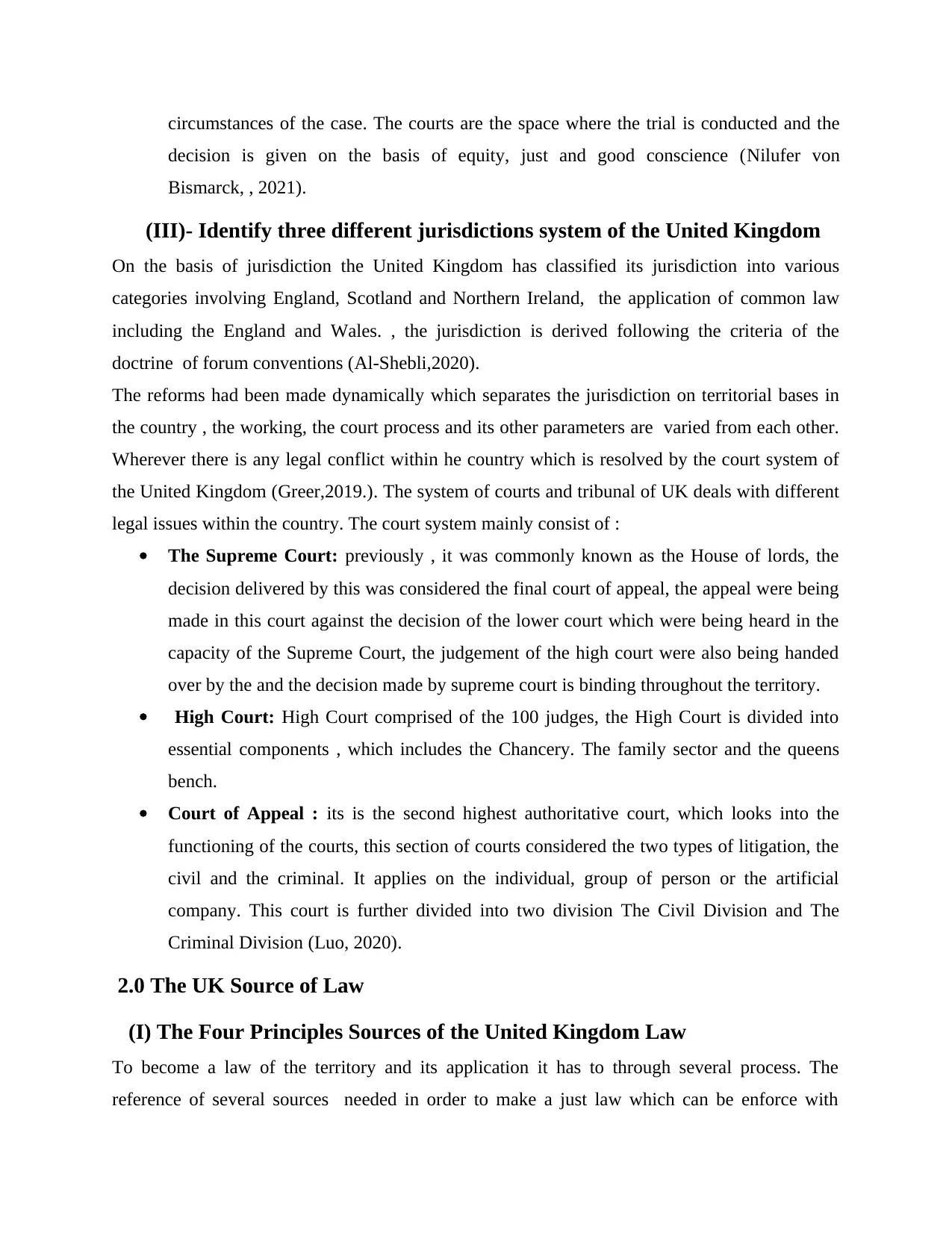
circumstances of the case. The courts are the space where the trial is conducted and the
decision is given on the basis of equity, just and good conscience (Nilufer von
Bismarck, , 2021).
(III)- Identify three different jurisdictions system of the United Kingdom
On the basis of jurisdiction the United Kingdom has classified its jurisdiction into various
categories involving England, Scotland and Northern Ireland, the application of common law
including the England and Wales. , the jurisdiction is derived following the criteria of the
doctrine of forum conventions (Al-Shebli,2020).
The reforms had been made dynamically which separates the jurisdiction on territorial bases in
the country , the working, the court process and its other parameters are varied from each other.
Wherever there is any legal conflict within he country which is resolved by the court system of
the United Kingdom (Greer,2019.). The system of courts and tribunal of UK deals with different
legal issues within the country. The court system mainly consist of :
The Supreme Court: previously , it was commonly known as the House of lords, the
decision delivered by this was considered the final court of appeal, the appeal were being
made in this court against the decision of the lower court which were being heard in the
capacity of the Supreme Court, the judgement of the high court were also being handed
over by the and the decision made by supreme court is binding throughout the territory.
High Court: High Court comprised of the 100 judges, the High Court is divided into
essential components , which includes the Chancery. The family sector and the queens
bench.
Court of Appeal : its is the second highest authoritative court, which looks into the
functioning of the courts, this section of courts considered the two types of litigation, the
civil and the criminal. It applies on the individual, group of person or the artificial
company. This court is further divided into two division The Civil Division and The
Criminal Division (Luo, 2020).
2.0 The UK Source of Law
(I) The Four Principles Sources of the United Kingdom Law
To become a law of the territory and its application it has to through several process. The
reference of several sources needed in order to make a just law which can be enforce with
decision is given on the basis of equity, just and good conscience (Nilufer von
Bismarck, , 2021).
(III)- Identify three different jurisdictions system of the United Kingdom
On the basis of jurisdiction the United Kingdom has classified its jurisdiction into various
categories involving England, Scotland and Northern Ireland, the application of common law
including the England and Wales. , the jurisdiction is derived following the criteria of the
doctrine of forum conventions (Al-Shebli,2020).
The reforms had been made dynamically which separates the jurisdiction on territorial bases in
the country , the working, the court process and its other parameters are varied from each other.
Wherever there is any legal conflict within he country which is resolved by the court system of
the United Kingdom (Greer,2019.). The system of courts and tribunal of UK deals with different
legal issues within the country. The court system mainly consist of :
The Supreme Court: previously , it was commonly known as the House of lords, the
decision delivered by this was considered the final court of appeal, the appeal were being
made in this court against the decision of the lower court which were being heard in the
capacity of the Supreme Court, the judgement of the high court were also being handed
over by the and the decision made by supreme court is binding throughout the territory.
High Court: High Court comprised of the 100 judges, the High Court is divided into
essential components , which includes the Chancery. The family sector and the queens
bench.
Court of Appeal : its is the second highest authoritative court, which looks into the
functioning of the courts, this section of courts considered the two types of litigation, the
civil and the criminal. It applies on the individual, group of person or the artificial
company. This court is further divided into two division The Civil Division and The
Criminal Division (Luo, 2020).
2.0 The UK Source of Law
(I) The Four Principles Sources of the United Kingdom Law
To become a law of the territory and its application it has to through several process. The
reference of several sources needed in order to make a just law which can be enforce with
Paraphrase This Document
Need a fresh take? Get an instant paraphrase of this document with our AI Paraphraser
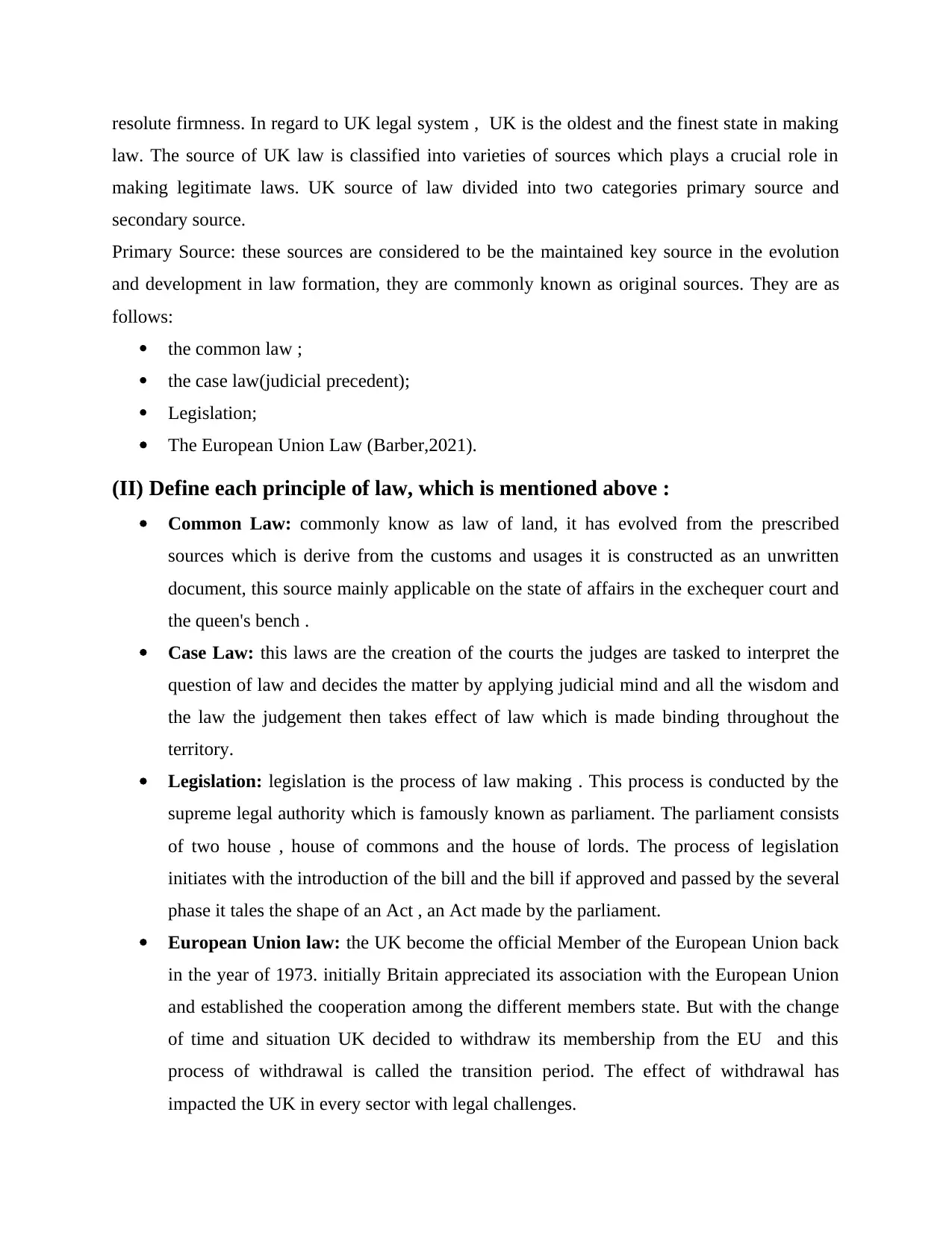
resolute firmness. In regard to UK legal system , UK is the oldest and the finest state in making
law. The source of UK law is classified into varieties of sources which plays a crucial role in
making legitimate laws. UK source of law divided into two categories primary source and
secondary source.
Primary Source: these sources are considered to be the maintained key source in the evolution
and development in law formation, they are commonly known as original sources. They are as
follows:
the common law ;
the case law(judicial precedent);
Legislation;
The European Union Law (Barber,2021).
(II) Define each principle of law, which is mentioned above :
Common Law: commonly know as law of land, it has evolved from the prescribed
sources which is derive from the customs and usages it is constructed as an unwritten
document, this source mainly applicable on the state of affairs in the exchequer court and
the queen's bench .
Case Law: this laws are the creation of the courts the judges are tasked to interpret the
question of law and decides the matter by applying judicial mind and all the wisdom and
the law the judgement then takes effect of law which is made binding throughout the
territory.
Legislation: legislation is the process of law making . This process is conducted by the
supreme legal authority which is famously known as parliament. The parliament consists
of two house , house of commons and the house of lords. The process of legislation
initiates with the introduction of the bill and the bill if approved and passed by the several
phase it tales the shape of an Act , an Act made by the parliament.
European Union law: the UK become the official Member of the European Union back
in the year of 1973. initially Britain appreciated its association with the European Union
and established the cooperation among the different members state. But with the change
of time and situation UK decided to withdraw its membership from the EU and this
process of withdrawal is called the transition period. The effect of withdrawal has
impacted the UK in every sector with legal challenges.
law. The source of UK law is classified into varieties of sources which plays a crucial role in
making legitimate laws. UK source of law divided into two categories primary source and
secondary source.
Primary Source: these sources are considered to be the maintained key source in the evolution
and development in law formation, they are commonly known as original sources. They are as
follows:
the common law ;
the case law(judicial precedent);
Legislation;
The European Union Law (Barber,2021).
(II) Define each principle of law, which is mentioned above :
Common Law: commonly know as law of land, it has evolved from the prescribed
sources which is derive from the customs and usages it is constructed as an unwritten
document, this source mainly applicable on the state of affairs in the exchequer court and
the queen's bench .
Case Law: this laws are the creation of the courts the judges are tasked to interpret the
question of law and decides the matter by applying judicial mind and all the wisdom and
the law the judgement then takes effect of law which is made binding throughout the
territory.
Legislation: legislation is the process of law making . This process is conducted by the
supreme legal authority which is famously known as parliament. The parliament consists
of two house , house of commons and the house of lords. The process of legislation
initiates with the introduction of the bill and the bill if approved and passed by the several
phase it tales the shape of an Act , an Act made by the parliament.
European Union law: the UK become the official Member of the European Union back
in the year of 1973. initially Britain appreciated its association with the European Union
and established the cooperation among the different members state. But with the change
of time and situation UK decided to withdraw its membership from the EU and this
process of withdrawal is called the transition period. The effect of withdrawal has
impacted the UK in every sector with legal challenges.
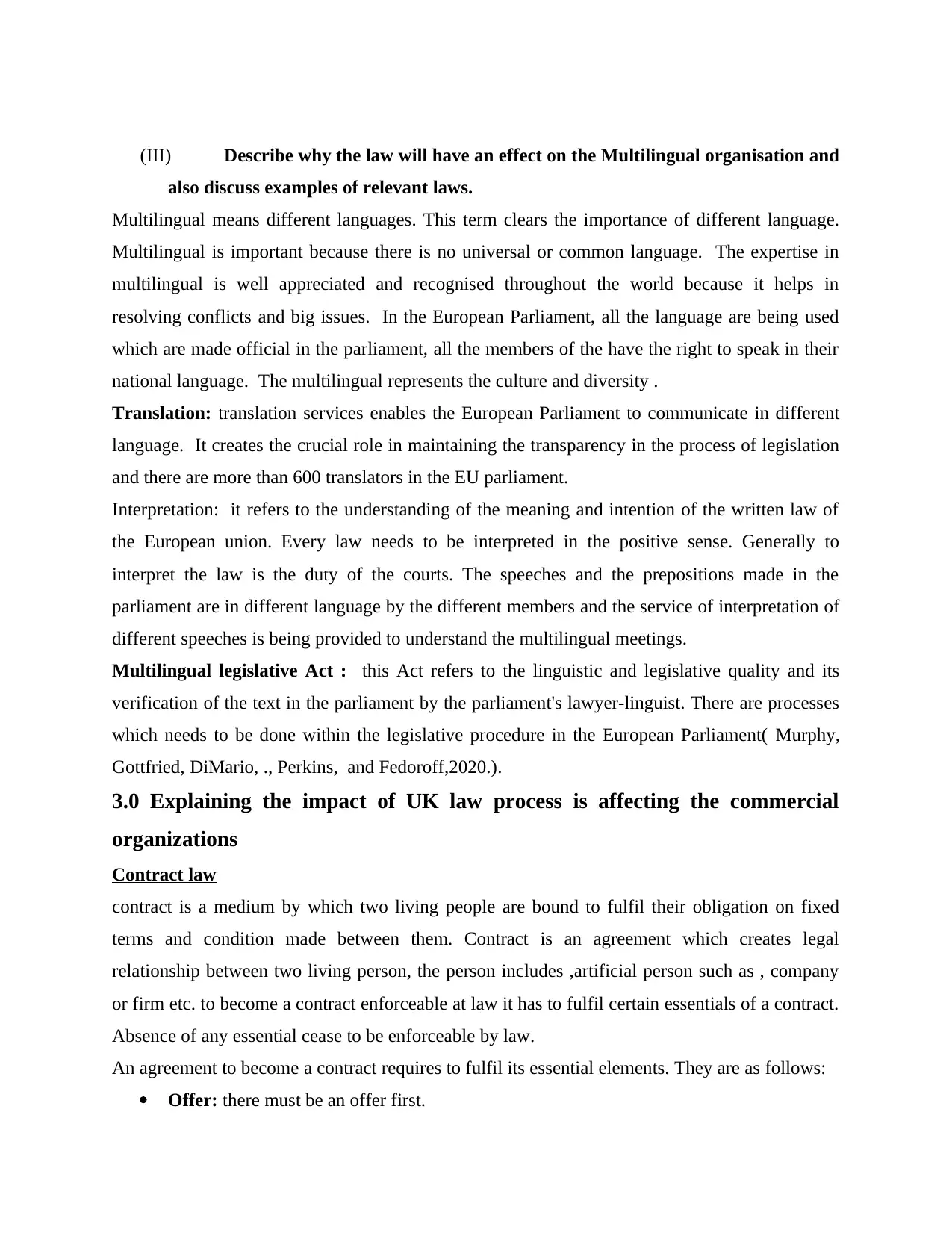
(III) Describe why the law will have an effect on the Multilingual organisation and
also discuss examples of relevant laws.
Multilingual means different languages. This term clears the importance of different language.
Multilingual is important because there is no universal or common language. The expertise in
multilingual is well appreciated and recognised throughout the world because it helps in
resolving conflicts and big issues. In the European Parliament, all the language are being used
which are made official in the parliament, all the members of the have the right to speak in their
national language. The multilingual represents the culture and diversity .
Translation: translation services enables the European Parliament to communicate in different
language. It creates the crucial role in maintaining the transparency in the process of legislation
and there are more than 600 translators in the EU parliament.
Interpretation: it refers to the understanding of the meaning and intention of the written law of
the European union. Every law needs to be interpreted in the positive sense. Generally to
interpret the law is the duty of the courts. The speeches and the prepositions made in the
parliament are in different language by the different members and the service of interpretation of
different speeches is being provided to understand the multilingual meetings.
Multilingual legislative Act : this Act refers to the linguistic and legislative quality and its
verification of the text in the parliament by the parliament's lawyer-linguist. There are processes
which needs to be done within the legislative procedure in the European Parliament( Murphy,
Gottfried, DiMario, ., Perkins, and Fedoroff,2020.).
3.0 Explaining the impact of UK law process is affecting the commercial
organizations
Contract law
contract is a medium by which two living people are bound to fulfil their obligation on fixed
terms and condition made between them. Contract is an agreement which creates legal
relationship between two living person, the person includes ,artificial person such as , company
or firm etc. to become a contract enforceable at law it has to fulfil certain essentials of a contract.
Absence of any essential cease to be enforceable by law.
An agreement to become a contract requires to fulfil its essential elements. They are as follows:
Offer: there must be an offer first.
also discuss examples of relevant laws.
Multilingual means different languages. This term clears the importance of different language.
Multilingual is important because there is no universal or common language. The expertise in
multilingual is well appreciated and recognised throughout the world because it helps in
resolving conflicts and big issues. In the European Parliament, all the language are being used
which are made official in the parliament, all the members of the have the right to speak in their
national language. The multilingual represents the culture and diversity .
Translation: translation services enables the European Parliament to communicate in different
language. It creates the crucial role in maintaining the transparency in the process of legislation
and there are more than 600 translators in the EU parliament.
Interpretation: it refers to the understanding of the meaning and intention of the written law of
the European union. Every law needs to be interpreted in the positive sense. Generally to
interpret the law is the duty of the courts. The speeches and the prepositions made in the
parliament are in different language by the different members and the service of interpretation of
different speeches is being provided to understand the multilingual meetings.
Multilingual legislative Act : this Act refers to the linguistic and legislative quality and its
verification of the text in the parliament by the parliament's lawyer-linguist. There are processes
which needs to be done within the legislative procedure in the European Parliament( Murphy,
Gottfried, DiMario, ., Perkins, and Fedoroff,2020.).
3.0 Explaining the impact of UK law process is affecting the commercial
organizations
Contract law
contract is a medium by which two living people are bound to fulfil their obligation on fixed
terms and condition made between them. Contract is an agreement which creates legal
relationship between two living person, the person includes ,artificial person such as , company
or firm etc. to become a contract enforceable at law it has to fulfil certain essentials of a contract.
Absence of any essential cease to be enforceable by law.
An agreement to become a contract requires to fulfil its essential elements. They are as follows:
Offer: there must be an offer first.
⊘ This is a preview!⊘
Do you want full access?
Subscribe today to unlock all pages.

Trusted by 1+ million students worldwide
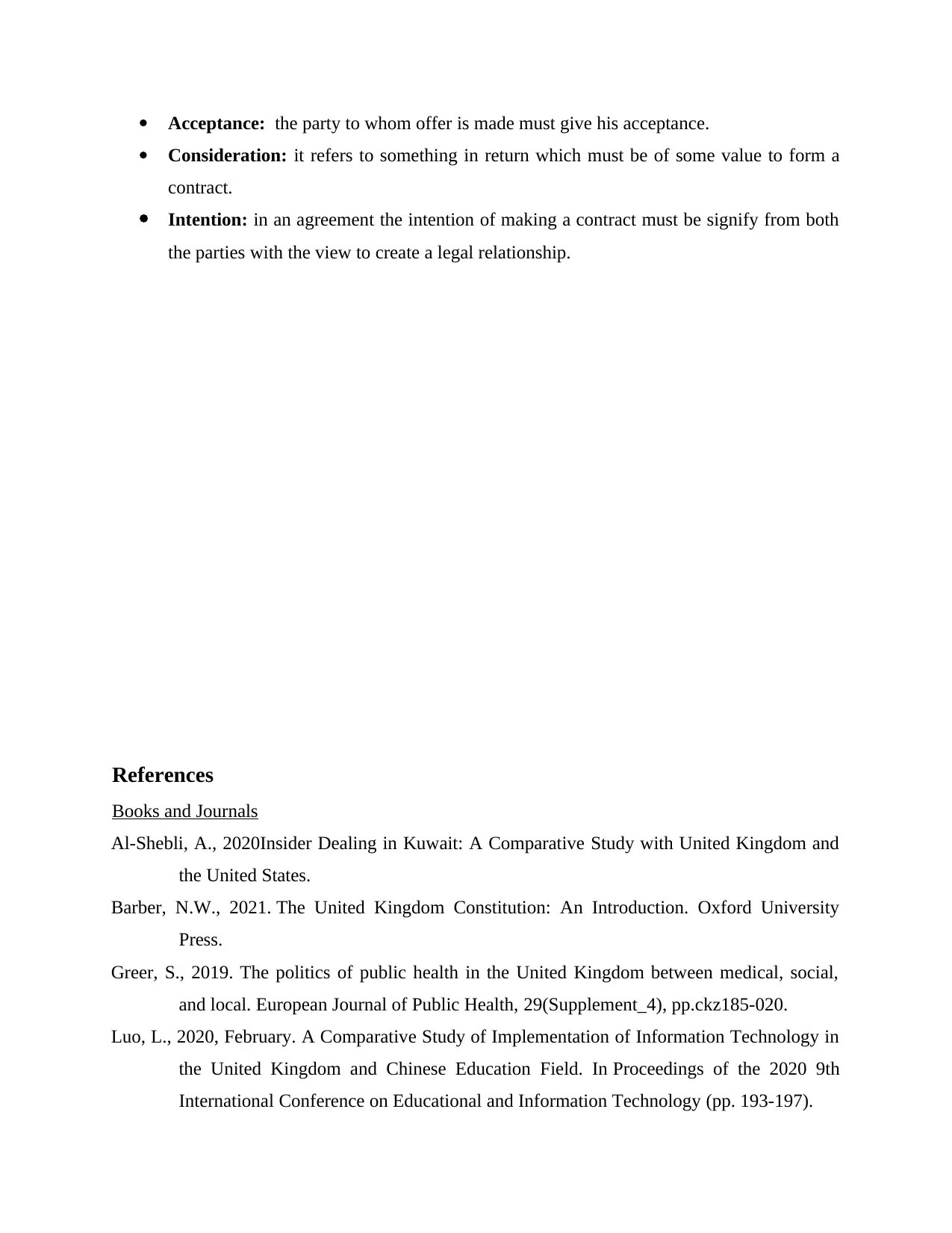
Acceptance: the party to whom offer is made must give his acceptance.
Consideration: it refers to something in return which must be of some value to form a
contract.
Intention: in an agreement the intention of making a contract must be signify from both
the parties with the view to create a legal relationship.
References
Books and Journals
Al-Shebli, A., 2020Insider Dealing in Kuwait: A Comparative Study with United Kingdom and
the United States.
Barber, N.W., 2021. The United Kingdom Constitution: An Introduction. Oxford University
Press.
Greer, S., 2019. The politics of public health in the United Kingdom between medical, social,
and local. European Journal of Public Health, 29(Supplement_4), pp.ckz185-020.
Luo, L., 2020, February. A Comparative Study of Implementation of Information Technology in
the United Kingdom and Chinese Education Field. In Proceedings of the 2020 9th
International Conference on Educational and Information Technology (pp. 193-197).
Consideration: it refers to something in return which must be of some value to form a
contract.
Intention: in an agreement the intention of making a contract must be signify from both
the parties with the view to create a legal relationship.
References
Books and Journals
Al-Shebli, A., 2020Insider Dealing in Kuwait: A Comparative Study with United Kingdom and
the United States.
Barber, N.W., 2021. The United Kingdom Constitution: An Introduction. Oxford University
Press.
Greer, S., 2019. The politics of public health in the United Kingdom between medical, social,
and local. European Journal of Public Health, 29(Supplement_4), pp.ckz185-020.
Luo, L., 2020, February. A Comparative Study of Implementation of Information Technology in
the United Kingdom and Chinese Education Field. In Proceedings of the 2020 9th
International Conference on Educational and Information Technology (pp. 193-197).
Paraphrase This Document
Need a fresh take? Get an instant paraphrase of this document with our AI Paraphraser
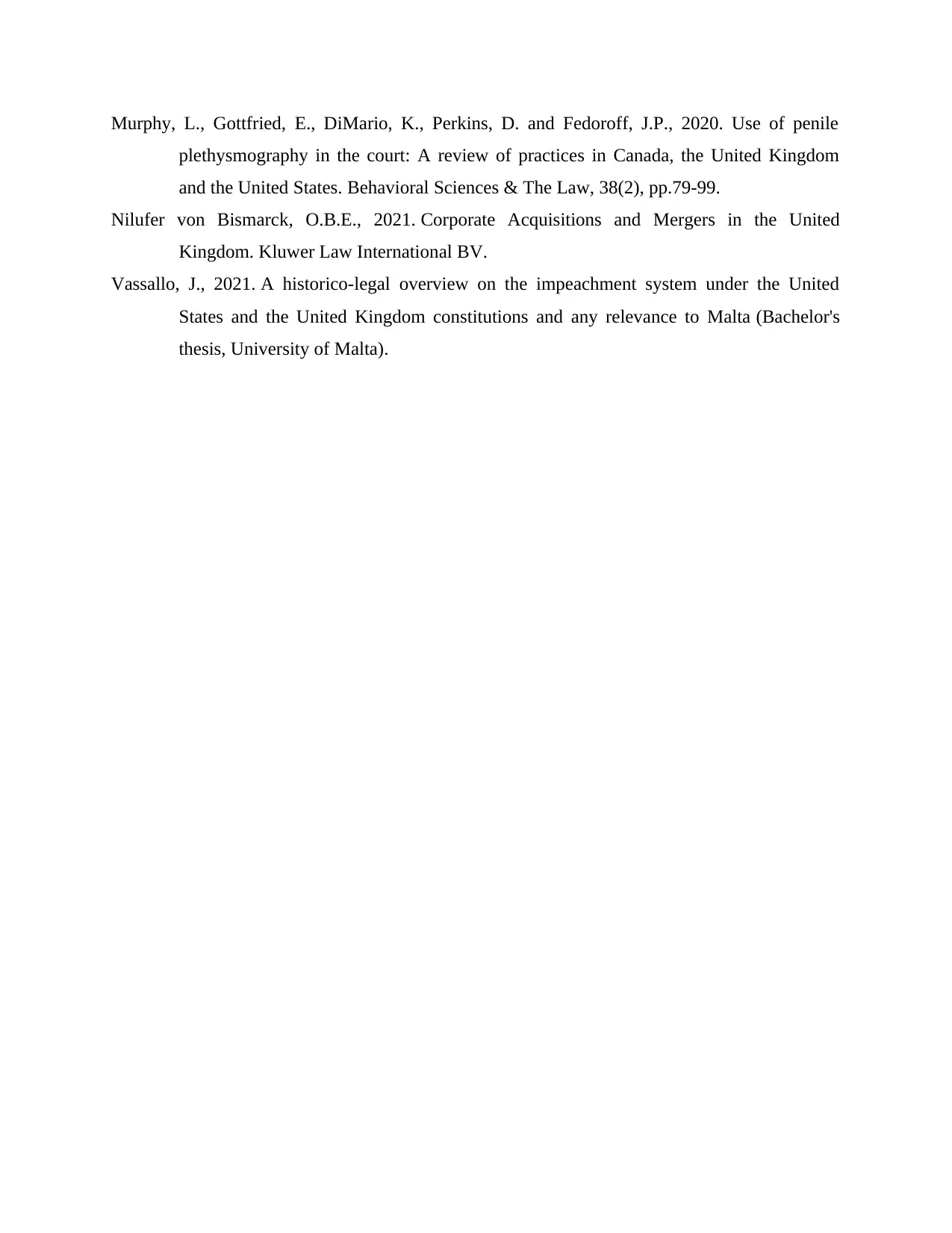
Murphy, L., Gottfried, E., DiMario, K., Perkins, D. and Fedoroff, J.P., 2020. Use of penile
plethysmography in the court: A review of practices in Canada, the United Kingdom
and the United States. Behavioral Sciences & The Law, 38(2), pp.79-99.
Nilufer von Bismarck, O.B.E., 2021. Corporate Acquisitions and Mergers in the United
Kingdom. Kluwer Law International BV.
Vassallo, J., 2021. A historico-legal overview on the impeachment system under the United
States and the United Kingdom constitutions and any relevance to Malta (Bachelor's
thesis, University of Malta).
plethysmography in the court: A review of practices in Canada, the United Kingdom
and the United States. Behavioral Sciences & The Law, 38(2), pp.79-99.
Nilufer von Bismarck, O.B.E., 2021. Corporate Acquisitions and Mergers in the United
Kingdom. Kluwer Law International BV.
Vassallo, J., 2021. A historico-legal overview on the impeachment system under the United
States and the United Kingdom constitutions and any relevance to Malta (Bachelor's
thesis, University of Malta).

⊘ This is a preview!⊘
Do you want full access?
Subscribe today to unlock all pages.

Trusted by 1+ million students worldwide

1 out of 10
Related Documents
Your All-in-One AI-Powered Toolkit for Academic Success.
+13062052269
info@desklib.com
Available 24*7 on WhatsApp / Email
![[object Object]](/_next/static/media/star-bottom.7253800d.svg)
Unlock your academic potential
Copyright © 2020–2026 A2Z Services. All Rights Reserved. Developed and managed by ZUCOL.



